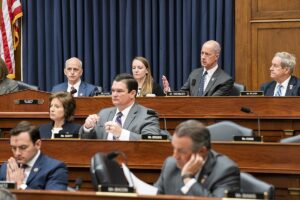The leaders of the House Armed Services Committee told reporters Monday they are both confident Congress will vote to override the president’s potential veto of the next defense policy bill.
Reps. Adam Smith (D-Wash.) and Mac Thornberry (R-Texas), the HASC chairman and ranking member, also agreed that a ‘skinny bill’ is not an option for passing portions of the fiscal year 2021 National Defense Authorization Act, which is set to receive a vote in the House on Tuesday.

“If the president vetoes it, we will come back to vote to override it,” Smith said in a press call. “We’ve got troop bonuses that will terminate. We’ve got [military construction projects] that will terminate. We’ve got land that the military would no longer be able to use for training. We have numerous other provisions in this bill that are crucial. We can’t not come back to vote to override it.”
The final conferenced version of the $741 billion FY ‘21 NDAA was released last week and includes authorizing 14 additional F-35s, funding the build of two Virginia-class submarines and calling for billions to establish a new Pacific Deterrence Initiative (Defense Daily, Dec. 4).
President Trump has repeatedly threatened to veto the bill over its inclusion of a directive to rename bases named after Confederate leaders and for not including a provision for stripping a social media-related regulation.
“I do not believe that the veto threat is empty. I think the president really believes it. He is very upset at social media companies, in particular. And the results of the election have poured fuel on the flames,” Thornberry, who is retiring from his seat, said in a separate press call on Monday.
Both Smith and Thornberry said they’re confident Republicans will vote to both pass the NDAA and come back to D.C. to override a potential veto, which would require a two-thirds vote in both chambers.
“I’m hoping for a strong vote tomorrow. I think the stronger the vote the less chance of having to deal with a veto later. But we don’t know, we’ll just have to take it one step at a time,” Thornberry said. “I think this conference report is better than either of the chambers’ bills. I know from a House Republicans’ standpoint, some of the reasons members voted against the bill on the House floor have gone away. So I’m pretty optimistic we’ll have a strong vote.”
The two lawmakers also cited the difficulty prospects of trying to pick up the NDAA effort in the next Congress and agreed that a skinny bill is a non-starter.
“Once you go through provision by provision, I think that’s really hard to pick and choose what you’re going to do. So I am not optimistic that [a skinny bill] is a way forward for any of this,” Thornberry said.
Smith told reporters that a skinny bill also wouldn’t include a repeal of Section 230, allowing social media companies’ to be liable for the content posted on their platforms, meaning the president would likely veto that bill as well.
“It doesn’t solve the problem. He will veto the skinny bill as well because what he wants is not in it,” Smith said.